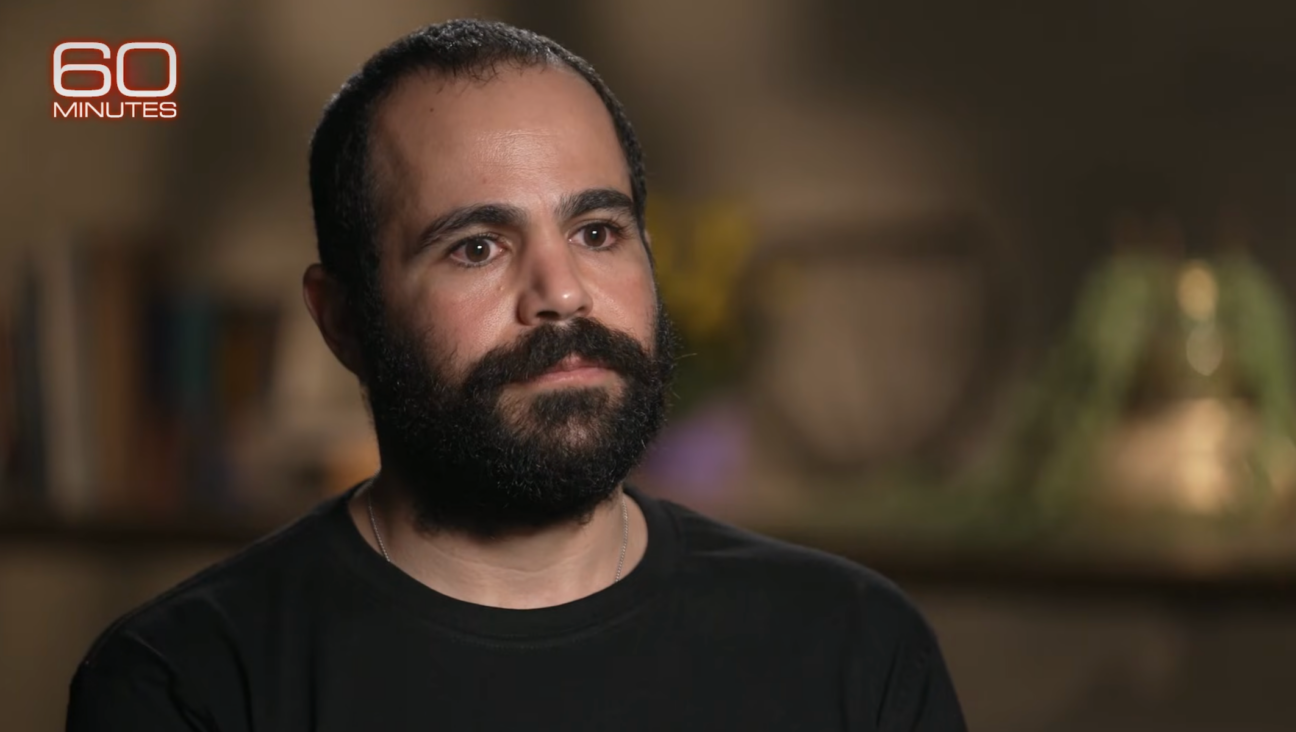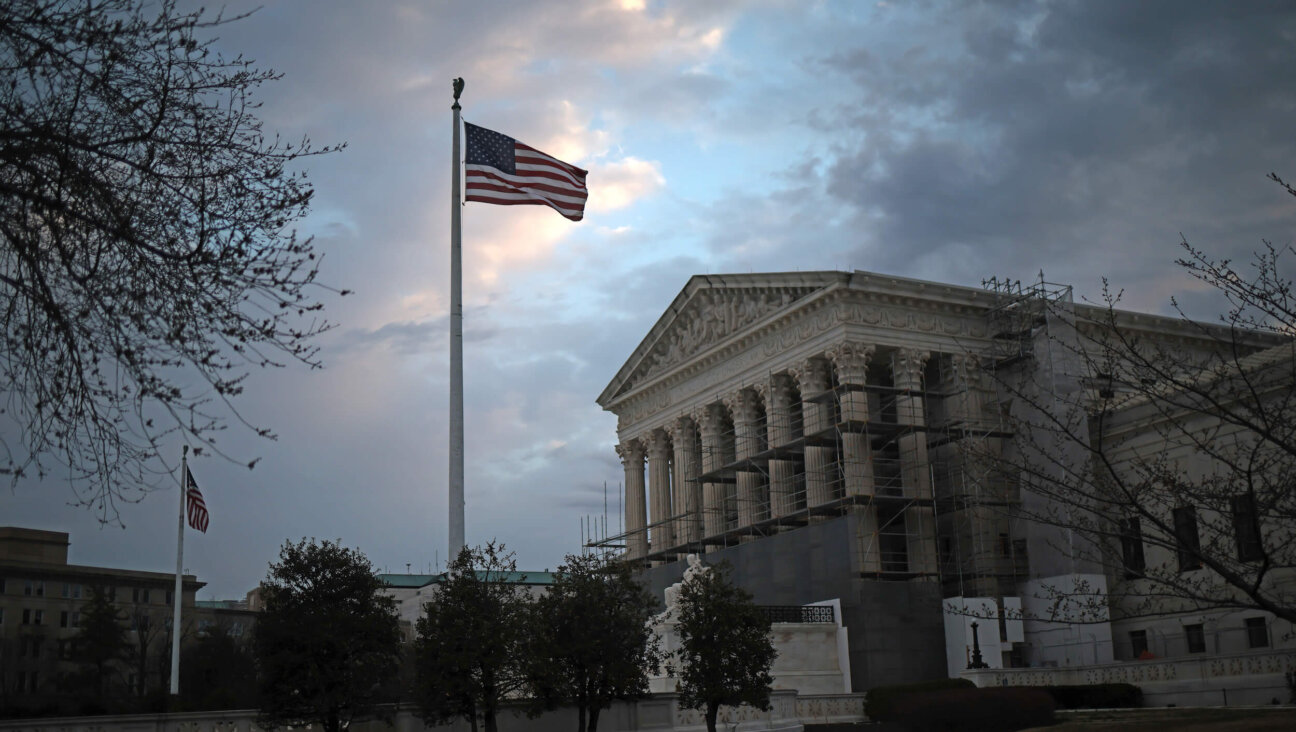Jewish Voters, Obama and the Great Elephant Hunt
Looking at the midterm election results, even a casual observer can find any number of obvious, unavoidable lessons about the state of our nation. For all the Republican chest-thumping and Democratic breast-beating in the election’s aftermath, it’s hard to miss the core truths that were exposed: the intensity of the economic distress, the depth of public frustration with politicians and the crippling extremity of politicians’ own polarization.
Here’s another lesson, not quite as obvious: the depth of the schism that’s increasingly dividing American Jews from one another — and from Israel. We’ve known for some time that we are growing apart in many ways, liberals from conservatives, Orthodox from Reform, Zionists from human rights activists. Now, with little warning, we’re finding that the various little fissures are merging to form a great, yawning chasm.
We’re finding, too, that Israel has taken on a new role in our communal debate. For a long time, Israel served as a unifier. Whatever else divided us, whether religiously, politically or temperamentally, Israel was the standard that rallied us, mostly. Now it is Israel that divides us, more than anything else, and our other quarrels seem to arrange themselves along the lines that Israel has drawn.
Since we’re talking about an election, let’s look at some numbers. Jewish voters voted for Democrats for Congress over Republicans on November 2 by a margin of 66% to 31%, or about two-to-one, according to an election-night exit poll conducted by J Street. Exit polls were also conducted by the Republican Jewish Coalition (RJC), and while it’s hard to compare the two — the Republican group polled local races in five states rather than a national sample — the results are similar enough to be convincing.
The RJC is touting the Democrats’ 66% Jewish showing as a GOP victory, since it’s lower than the 78% of Jewish votes that Barack Obama won in 2008. This shows, the Coalition said in a statement, that “the GOP is making inroads among Jewish voters.”
J Street, by contrast, is celebrating the Democratic margin as evidence that “Jewish voters remain a core progressive constituency that strongly supported Democratic candidates despite the national wave” of Republican victories. “Republicans and conservatives,” the group stated, “have no traction with American Jews.”
Who’s right? We’ll give J Street a partial win on points. Despite what the RJC says, there’s nothing unusual about a 66% Democratic showing among Jewish voters. Since 1928, Democrats have repeatedly seesawed between earning 60% and 82% of the Jewish vote. They’ve reached 90% three times (Franklin Roosevelt in 1940 and 1944, Lyndon Johnson in 1964) and dropped below 60% only once (Jimmy Carter in 1980, with 45%). Nor is there anything historic about the Republicans’ 31%; they’ve done better than that in seven of the last 21 presidential years, twice reaching up to 40% (Dwight Eisenhower in 1956 and Ronald Reagan in 1980). Still, historic or not, 31% can hardly be called “no traction.”
What’s often overlooked is the existence of a Jewish swing vote that’s up for grabs in every election. Between the 40% that Republicans can win in a good year and their 10% in a bad year, there’s a Jewish voting bloc of about 30% that can be moved.
Less clear is what moves them. The J Street poll asked voters what issues were important in determining their vote. Israel came in eighth of 14 choices, named by just 7% of respondents. The top five issues were all domestic: the economy, health care, the deficit, Social Security and taxes. The American Jewish Committee’s annual Jewish opinion survey produces nearly identical results. Israel apparently isn’t decisive in shaping Jewish voting choices.
Except when it is. The two most dramatic swings in Jewish voting in the last 30 years had a lot to do with Israel: with 45% of the Jewish vote, Jimmy Carter garnered a record low for a Democrat in 1980, and with 12% of the Jewish vote, George H.W. Bush earned a near-record low for a Republican in 1992. The surveys don’t show it, but when a candidate sets off alarm bells, Israel matters big time.
Obama, despite all the thunder and lightning around him, didn’t ring many bells. Israelis might not like the president’s hard-nosed stand on settlements, but American Jews don’t agree. Both of the post-election surveys actually gave him high marks for his performance in Israel and Middle East affairs. J Street found solid Jewish support for a two-state solution and for vigorous American leadership to bring the parties together — even if it means pressuring the two sides or openly criticizing Israel.
There’s one exception, though, and it’s a big one. Obama is liked and trusted among Reform and Conservative Jews — more so among Reform than Conservative — but not among Orthodox Jews. Nationwide, by J Street’s numbers, Democrats this year won among Reform Jews by 72% to 24% and Conservative Jews by 58% to 39%, but lost the Orthodox vote 44% to 53%.
In some local races, the gap was much more dramatic. In New York’s 4th congressional district, on Long Island, Democratic incumbent Carolyn McCarthy bested Republican Fran Becker among Jewish voters by about two to one, according to the RJC survey. McCarthy won Reform voters by 80% to 11% and Conservative voters by 61% to 21%. However, she lost by a whopping 15% to 64% among Orthodox voters, about one-fifth of the district’s Jewish population. (Percentages don’t add up to 100 when some respondents don’t answer a question.) Similar ratios emerged in races surveyed in Illinois, Pennsylvania and Connecticut. Given the slow but steady rise of Orthodox Jews as a proportion of American Jewry, signs point to a more Republican Jewish future.
The RJC’s fifth sample, a Nevada House race in suburban Las Vegas, was anomalous: The Democrat won the Orthodox vote but lost among Conservative Jews. But apparently, that stays in Vegas.
Contact J.J. Goldberg at [email protected] and follow his blog at www.forward.com
The Forward is free to read, but it isn’t free to produce

I hope you appreciated this article. Before you go, I’d like to ask you to please support the Forward.
At a time when other newsrooms are closing or cutting back, the Forward has removed its paywall and invested additional resources to report on the ground from Israel and around the U.S. on the impact of the war, rising antisemitism and polarized discourse.
Readers like you make it all possible. We’ve started our Passover Fundraising Drive, and we need 1,800 readers like you to step up to support the Forward by April 21. Members of the Forward board are even matching the first 1,000 gifts, up to $70,000.
This is a great time to support independent Jewish journalism, because every dollar goes twice as far.
— Rachel Fishman Feddersen, Publisher and CEO
2X match on all Passover gifts!
Most Popular
- 1

Film & TV What Gal Gadot has said about the Israeli-Palestinian conflict
- 2

News A Jewish Republican and Muslim Democrat are suddenly in a tight race for a special seat in Congress
- 3

Fast Forward The NCAA men’s Final Four has 3 Jewish coaches
- 4

Culture How two Jewish names — Kohen and Mira — are dividing red and blue states
In Case You Missed It
-

Books The White House Seder started in a Pennsylvania basement. Its legacy lives on.
-

Fast Forward The NCAA men’s Final Four has 3 Jewish coaches
-

Fast Forward Yarden Bibas says ‘I am here because of Trump’ and pleads with him to stop the Gaza war
-

Fast Forward Trump’s plan to enlist Elon Musk began at Lubavitcher Rebbe’s grave
-
Shop the Forward Store
100% of profits support our journalism
Republish This Story
Please read before republishing
We’re happy to make this story available to republish for free, unless it originated with JTA, Haaretz or another publication (as indicated on the article) and as long as you follow our guidelines.
You must comply with the following:
- Credit the Forward
- Retain our pixel
- Preserve our canonical link in Google search
- Add a noindex tag in Google search
See our full guidelines for more information, and this guide for detail about canonical URLs.
To republish, copy the HTML by clicking on the yellow button to the right; it includes our tracking pixel, all paragraph styles and hyperlinks, the author byline and credit to the Forward. It does not include images; to avoid copyright violations, you must add them manually, following our guidelines. Please email us at [email protected], subject line “republish,” with any questions or to let us know what stories you’re picking up.
















